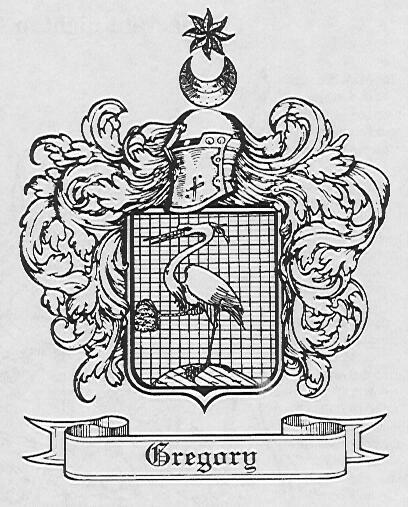|
A Gregory Coat
of Arms.
Gregory web site
|
The GREGORY Name
Origin : Latin
Meaning: "Vigilante, Watchman"
Starting in the 12th century and by the end of the 13th century most of the people of
England, Ireland, Scotland and Wales had adopted the practice of adding a surname to their
given names to distinguish individuals better. At first the names usually indicated either
an occupation (Smith, Miller, Cook) or a location (Overhill, Brook, London) or from the
father (John-son, William-son) or a characteristic (Lytle, Short, Small, Longfellow).
In very early languages Gregory (or other versions) have been found to mean
"watchful" or "watchers"; so it’s possible that the name could
have been given to some kind of fortress or palace guards. An early English translation
indicates that it meant "Son of Gregory" or "Son of a Gregory".
Some other versions of the Gregory name are: Gregor, Greggor, Grigorey (Russian) and
MacGregor (Scottish).

Our Gregory Family
Although there have been Gregory’s in America since Europeans have been emigrating
here, when exactly our Gregory ancestor came to America has not yet been determined.
Deductions made from information gathered from our earliest confirmed ancestor, John
Gregory, indicate that it was probably in the mid to late 1700’s. Possibly this
ancestor fought in the Revolutionary War, but on which side?
John Gregory (the earliest confirmed ancestor in our line)
was born (according to his Missouri census records) in Virginia in 1808. (West Virginia
was part of Virginia at this time and his birthplace could be in what is today West
Virginia).
Sometime after his birth, whether it was with his parents or later after he left home he
followed the migration west and moved to northeastern Missouri where he found a wife
(Frances Rush) and bought land in Lewis County, Missouri to farm. Census records show John
Gregory lived on and was farming this land from before 1850 to after 1880. At age 72 not
only was he still farming but he and Frances were taking care of a granddaughter.
John and Frances had 10 known children. Their 4th child was Alexander, the father of
William, Marshall, James Wade, Frances and Charlie Gregory.
The amount of information that the U. S. census gathered increased in each decade, which
provided more information for the family researcher. For the first time in the US the 1880
census asked individuals where their parents were born. John indicated that his father was
born in England and his mother in Virginia. This indicates that his father (name unknown
at this time) came to America as a boy in the 1700’s or as a young man in the late
1700’s to very early 1800’s where he married a Virginia woman and started our
American heritage.
ALEXANDER GREGORY
There is a family tale of how Alexander got into trouble as a
young man in Missouri and his father gave him a "fast horse" and sent him out
for Texas.
From census records we know Alexander lived in Missouri in 1860 and was no
longer with the family in 1870. No other records of him have have been
found until he until
he showed up in the 1880 census in Stephens County, Texas. He owned a ranch
there and had his own brand.
Where was he between 1860 and 1880? The Civil War was fought during this period, Lewis County, Missouri was
torn by both sides. Did he get caught up in that bloody war?
Was he on the run? Maybe he was just exploring the wild west.
In 1880 he had a wife and two boys, William and Marshall. William, the oldest was only
3 years old so they probably were married in the mid 1870's. No more records have
ever been found on Alexander and his wife Sarah. It is known that he had three more
children; James Wade, Fannie and
Charles. There are many stories in the family about what happened to Alexander.
The youngest son Charles was born in Indian Territory in 1887 in the
Chickasaw Nation. Alexander and his wife died in this time before 1900 when their children were
young and the
children spent time in an orphanage and working like "slaves" for an Uncle T or
Uncle Ben (on their mothers side).
None of the children passed along the information about what happened to
Alexander and Sarah and no records have been found to tell the story.
Different family stories have said he was killed outrunning a posse, or he was killed as part of a
posse or he was
killed over a land/fence dispute or he and his wife died of a "river disease" in
Oklahoma. The 1890's were the time of the great land rushes in Oklahoma,
property line disputes were quite common.
The next documentation showing the children of Alexander started in the early 1900’s
in Oklahoma. They seemed to try to always stay together, as they lived in the Davis,
Oklahoma area where James Wade and possibly Marshall worked for the railroad and finally
in the Lone Wolf, Oklahoma area to farm. When the dust bowl hit they were forced to start
moving west to survive. Fannie was the only one that stayed and lived the rest of her life
in Duncan, Oklahoma. William went on to California to farm and raise his famous
watermelons, James Wade, Marshall and Charlie to Oregon to cash in on that
"limitless" timber industry.
Gregory web site
|

